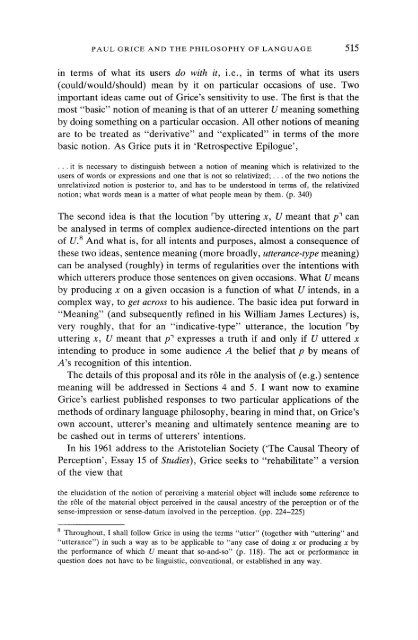Paul Grice and the philosophy of language
Paul Grice and the philosophy of language
Paul Grice and the philosophy of language
You also want an ePaper? Increase the reach of your titles
YUMPU automatically turns print PDFs into web optimized ePapers that Google loves.
PAUL GRICE AND THE PHILOSOPHY OF LANGUAGE 515<br />
in terms <strong>of</strong> what its users do with it, i.e., in terms <strong>of</strong> what its users<br />
(could/would/should) mean by it on particular occasions <strong>of</strong> use. Two<br />
important ideas came out <strong>of</strong> <strong>Grice</strong>'s sensitivity to use. The first is that <strong>the</strong><br />
most "basic" notion <strong>of</strong> meaning is that <strong>of</strong> an utterer U meaning something<br />
by doing something on a particular occasion. All o<strong>the</strong>r notions <strong>of</strong> meaning<br />
are to be treated as "derivative" <strong>and</strong> "explicated" in terms <strong>of</strong> <strong>the</strong> more<br />
basic notion. As <strong>Grice</strong> puts it in 'Retrospective Epilogue',<br />
•.. it is necessary to distinguish between a notion <strong>of</strong> meaning which is relativized to <strong>the</strong><br />
users <strong>of</strong> words or expressions <strong>and</strong> one that is not so relativized;.., <strong>of</strong> <strong>the</strong> two notions <strong>the</strong><br />
unrelativized notion is posterior to, <strong>and</strong> has to be understood in terms <strong>of</strong>, <strong>the</strong> relativized<br />
notion; what words mean is a matter <strong>of</strong> what people mean by <strong>the</strong>m. (p. 340)<br />
The second idea is that <strong>the</strong> locution qgy uttering x, U meant that p7 can<br />
be analysed in terms <strong>of</strong> complex audience-directed intentions on <strong>the</strong> part<br />
<strong>of</strong> U. 8 And what is, for all intents <strong>and</strong> purposes, almost a consequence <strong>of</strong><br />
<strong>the</strong>se two ideas, sentence meaning (more broadly, utterance-type meaning)<br />
can be analysed (roughly) in terms <strong>of</strong> regularities over <strong>the</strong> intentions with<br />
which utterers produce those sentences on given occasions. What U means<br />
by producing x on a given occasion is a function <strong>of</strong> what U intends, in a<br />
complex way, to get across to his audience. The basic idea put forward in<br />
"Meaning" (<strong>and</strong> subsequently refined in his William James Lectures) is,<br />
very roughly, that for an "indicative-type" utterance, <strong>the</strong> locution ~by<br />
uttering x, U meant that p7 expresses a truth if <strong>and</strong> only if U uttered x<br />
intending to produce in some audience A <strong>the</strong> belief that p by means <strong>of</strong><br />
A's recognition <strong>of</strong> this intention.<br />
The details <strong>of</strong> this proposal <strong>and</strong> its r61e in <strong>the</strong> analysis <strong>of</strong> (e.g.) sentence<br />
meaning will be addressed in Sections 4 <strong>and</strong> 5. I want now to examine<br />
<strong>Grice</strong>'s earliest published responses to two particular applications <strong>of</strong> <strong>the</strong><br />
methods <strong>of</strong> ordinary <strong>language</strong> <strong>philosophy</strong>, bearing in mind that, on <strong>Grice</strong>'s<br />
own account, utterer's meaning <strong>and</strong> ultimately sentence meaning are to<br />
be cashed out in terms <strong>of</strong> utterers' intentions.<br />
In his 1961 address to <strong>the</strong> Aristotelian Society ('The Causal Theory <strong>of</strong><br />
Perception', Essay 15 <strong>of</strong> Studies), <strong>Grice</strong> seeks to "rehabilitate" a version<br />
<strong>of</strong> <strong>the</strong> view that<br />
<strong>the</strong> elucidation <strong>of</strong> <strong>the</strong> notion <strong>of</strong> perceiving a material object will include some reference to<br />
<strong>the</strong> r61e <strong>of</strong> <strong>the</strong> material object perceived in <strong>the</strong> causal ancestry <strong>of</strong> <strong>the</strong> perception or <strong>of</strong> <strong>the</strong><br />
sense-impression or sense-datum involved in <strong>the</strong> perception. (pp. 224-225)<br />
s Throughout, I shall follow <strong>Grice</strong> in using <strong>the</strong> terms "utter" (toge<strong>the</strong>r with "uttering" <strong>and</strong><br />
"utterance") in such a way as to be applicable to "any case <strong>of</strong> doing x or producing x by<br />
<strong>the</strong> performance <strong>of</strong> which U meant that so-<strong>and</strong>-so" (p. 118). The act or performance in<br />
question does not have to be linguistic, conventional, or established in any way.














